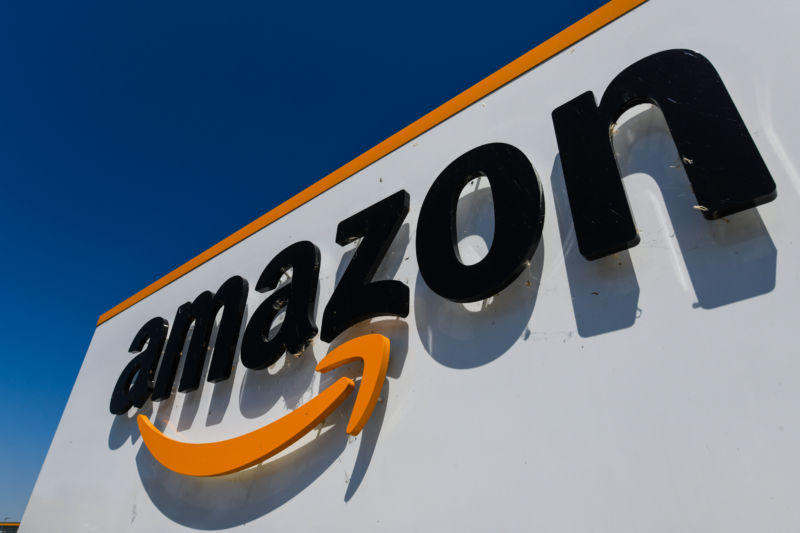playing favorites –
Chinese knockoffs and Amazon’s shipping carrot / stick hurt vendors, reports say.
Kate Cox –

Enlarge/The Amazon logo at the entrance of a logistics center in France, July 2019.
Amazon has come quite a way from when it was just an online bookstore, but it still operates a booming retail business among all its other ventures. A majority of the retail products sold on Amazon aren’t actually soldbyAmazon at all but rather by its sprawling network of third-party “marketplace” vendors. The company’s relationships with those vendors, foreign and domestic, are at the center of a web of investigations and criticism.
Third-party retailers accounted for about 58% of Amazon’s retail activity in 2018, company CEO Jeff Bezos said earlier this year, and they sold a cumulative $ 160 billion worth of goods . But those goods are sold in a “flea market” environment with minimal quality control, leading to ubiquitous counterfeits orrecalled goodsavailable for sale from fly-by-night merchants. If something goes wrong with your sale,getting recourse from these sellers is impossible.
Risky imports
All those kinda shady Amazon listings from companies in China you never heard of? They’re not a bug, The Wall Street Journalreports today. They’re a feature, present by design.
Amazon began a deliberate campaign in 2013 urging businesses in China to use its platform to sell directly to international customers, the WSJ writes. In 2017, an Amazon sales director based in China told business leaders in that country, “We help factories directly open accounts on Amazon and sell to US customers directly. This is our value.”
The company made its website fully available in Mandarin in 2015, and by 2016, its team for recruiting and helping Chinese vendors was up to 150 employees, a former Amazon employee told the WSJ.
Earlier this year, the Journal foundthousandsof defective, recalled, or banned items for sale on Amazon. Those goods were sold by thousands of different merchants. Of the nearly 2, 000 the WSJ could identify addresses for, 54% were based in China.
As of October, about 38% of the 10, 000 most-reviewed merchant accounts on Amazon were based in China, analysts found; that number was around 25% in 2016. The WSJ and analytics firm Marketplace Pulse had to discern the business locations from their merchant pages on Amazon’s Mexico site, as vendors are not required to disclose their locations on the US site.
Amazon disputed the WSJ’s number, calling it “a significant exaggeration of the real percentage of the top 10 thousand. ” Amazon, however, did not provide a different number.
Meanwhile, new product listings appear on Amazon from China every 1 / 50 th of a second, according to the WSJ, and that comes with some headaches. “Concerns at Amazon about Chinese listings arose several years ago in its China team, which noticed that, as local sellers flocked to the platform, it saw increasing patterns of fraud, counterfeits, and unsafe products,” former Amazon employees based in China told the WSJ.
“Bad actors make up a tiny fraction of activity in our store and, like honest sellers, can come from every corner of the world, “Amazon told the WSJ in response. “Regardless of where they are based, we work hard to stop bad actors before they can impact the shopping or selling experience in our store.”
When Amazon’s the bad actor
Amazon’s handling of its US marketplace vendors, meanwhile, is under deep scrutiny by federal regulators. Bloombergrecently obtaineda letter one Amazon merchant sent to the House Antitrust Subcommittee, which is investigating Amazon, accusing the company of anticompetitive acts.
The letter “accuses Amazon of tying its marketplace and logistics services together,” Bloomberg reports — using dominance in one business market to gain leverage in another, in a way that violates competition law.
Amazon has focused intensely on increasing its own in-house shipping business in recent years, and it now contracts withHundreds of third-party last-mile firmsto get products from its warehouses to your door. That Prime-branded delivery service has continued to grow as competitorssuch as FedExhave stopped working with Amazon.
The merchant alleges that fees for using Amazon logistics have increased by 20% over the past four years and now cost as much as 35 % more than competing services. But vendors are forced into paying the higher fees and using Amazon anyway, the complaint says, because Amazon promotes discovery for products it can mark as “fulfilled by Amazon” and demotes those that are not.
“The sticks Amazon uses to coerce merchants to use its logistics services are strict penalties, including getting kicked off the platform, for merchants who handle their own logistics, “Bloomberg reports. “Merchants using Amazon logistics services aren’t penalized when customer orders arrive late, even though they frequently do, since that’s Amazon’s responsibility. Those who handle their own logistics face stiff penalties for even minor delivery mishaps, including being suspended from selling on the platform , “the vendor alleges.
The claims come as Amazon faces antitrust probesin both the US and EUinvestigating its marketplace. Critics say that the company collects data from third-party marketplace sales to choose what it should produce and promote in its own house brands.
“When providing a marketplace for independent sellers, Amazon continuously collects data about the activity on its platform,” the European Commission’s competition bureausaid in July. “Based on the Commission’s preliminary fact-finding, Amazon appears to use competitively sensitive information — about marketplace sellers, their products and transactions on the marketplace,” to boost its own sales.






GIPHY App Key not set. Please check settings